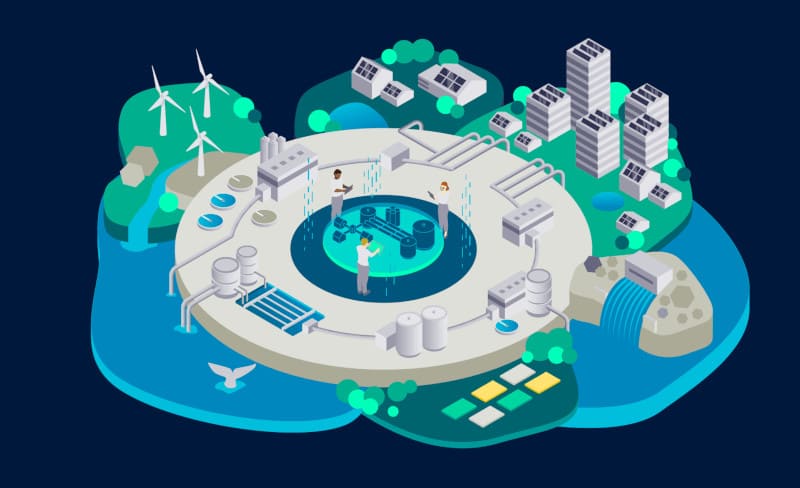Siemens has expanded its software portfolio for the water industry, enabling its customers to optimize their plant operations using artificial intelligence – without the need for technical expertise. These self-service solutions enable users to address the most pressing issues in water and wastewater operations: reducing water loss, preventing pollution from sewers, and ensuring the reliability of treatment assets.
The effect of these applications is also a contribution to greater sustainability overall, as the world’s water resources can be better protected. “Digital technologies have not yet been widely adopted in the water sector so far,” says Anja Eimer, General Manager Global Water Business at Siemens. “The existing OT and IT device landscape of is complex, skilled workers are in short supply, and the business benefits of many digital applications have often been unclear. With our new software offerings, we are adressing these conditions and enabling water companies to perform AI-based operational analyses.”
The new offerings include digitalization solutions with pre-integrated hardware and software. This means that AI-based analytics applications have been combined with corresponding sensors from Siemens to make the installment processes as easy as possible and to achieve faster analytics results. To this end, Siemens has launched the new SIWA Leak Finder and SIWA Blockage Predictor apps – available on the Siemens Xcelerator Marketplace.
AI to combat leaks and pipe blockages
The SIWA Leak Finder app uses data from smart flow meters to reduce water losses from pipe leaks by up to 50 percent. The app’s AI analyzes flow data and identifies leaks as small as 0.2 liters per second. While data from any flow meter can be used for the app, the integration of the Siemens Sitrans FM Mag8000 sensor eliminates the need for specialized knowledge or Siemens services for installation.
Clogged pipes in sewer systems can lead to pollution that also affects households and the environment. Inflow and infiltration (I&I) reduce the effectiveness of the wastewater network and can lead to expensive investments. Siemens’ SIWA Blockage Predictor application applies AI to water level data from sewers collected by sensors such as the Sitrans LR110 radar level transmitter to detect blockages, inflow and infiltration. Based on a single sensor installation, the app can be used in the event of network overflows or in manhole chambers. The application finds nine out of ten blockages and saves users time by automatically generating performance reports for regulators.
Both the SIWA Leak Finder and SIWA Blockage Predictor apps can easily process and analyze operational data from smart sensors via a connection to the cloud – without the need for additional IT expertise. In this way, the sensor data is available in the respective application within two hours. The apps’ AI is automatically trained and implemented with the sensor data from the day of installation. Cybersecurity is also taken into account in the design of the apps. Mendix, Siemens’ low-code platform, can also be used to create interfaces to the respective company’s IT making it possible to connect the data from the SIWA apps to ERP systems. Siemens’ expects these applications to typically pay for themselves in less than 36 months.
Siemens at IFAT 2024
In addition to AI-based applications and their integration with smart sensors for the more efficient and sustainable operation of water infrastructures, Siemens will showcase its entire automation and digitalization portfolio for the water industry at the IFAT 2024 trade fair. One focus will be on cybersecurity and how water infrastructure operators can protect themselves from cyberattacks. Siemens will showcase blueprints and guidelines for secure network and system architectures as well as proven, certified cybersecurity solutions. Siemens also provides assistance with the implementation of the NIS 2 Directive, which will go into effect in the EU in October 2024.
Furthermore, Siemens offers a standardized approach to groundwater well monitoring from a single source. Designed as an end-to-end solution, it includes instrumentation, communication, remote control, and intelligent data analysis to meet current and future regulatory requirements and enable scalable and efficient water management. Siemens also offers a range of technologies for utilities seeking to improve their energy efficiency, from the Digital Process Twin to multimodal energy optimization.

